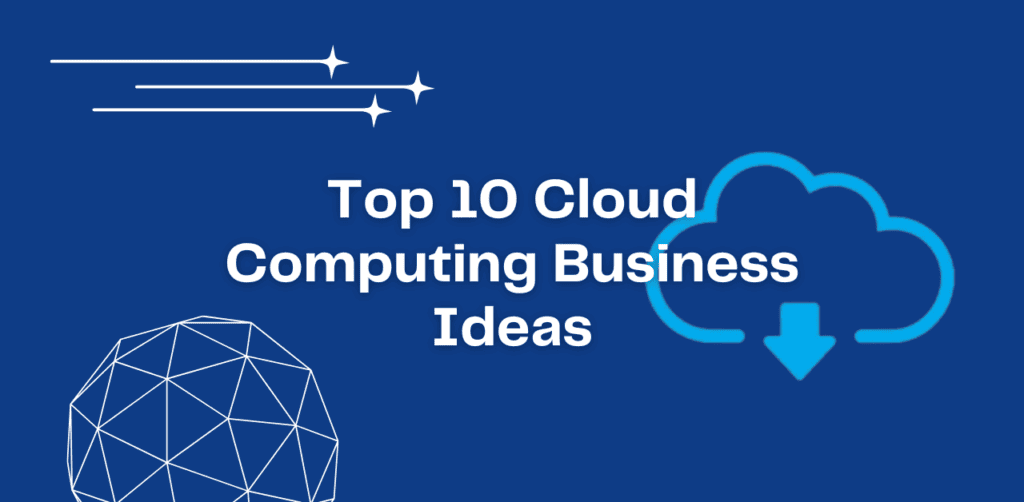The Cloud Computing Industry is evolving continuously. It is reshaping the world and creating countless opportunities for innovative entrepreneurs. In 2025, cloud-based businesses will be the most profitable as every company today relies upon cloud computing services for everything from data storage to complex AI-driven applications. Whether you want to start a venture or expand your business, cloud computing offers numerous possibilities with scalable solutions, minimal upfront cost, and high growth potential. The cloud computing market is expected to reach $2950 billion by 2033 with a compound annual growth rate of 17.1% from 2024.
Here are the top 10 cloud computing business ideas that could be highly profitable by 2025.
1. Cloud-Based Inventory Management for Small Retailers
Many small retailers struggle to manage their inventory effectively. A cloud-based inventory management system can help them easily track stock levels, manage their suppliers, and automatically reorder products when the stock is low. You can create a user-friendly interface and can target those businesses with zero to less technical expertise. A monthly subscription fee can be charged depending on the number of products and orders they manage. This software can easily integrate with popular e-commerce platforms like Shopify or Woocommerce.
2. Cloud-Powered Document Collaboration Tool
Many small teams and freelancers today need efficient ways to collaborate on documents in real time. You can design a cloud-based platform similar to Google and Dropbox where you can offer real-time collaboration features, version control, and secure file sharing. You can also provide additional features like workflow automation or integration with other tools such as Slack or Notion. A subscription-based business model can make it profitable by targeting creative agencies, marketing teams, and remote workers.
3. Cloud-Based Fitness Tracking Platform for Personal Trainers
Personal Trainers and fitness clients often need to manage their several client’s progress and fitness data every day. A cloud-based fitness tracking platform can give an advantage to Trainers and fitness coaches to track workouts, nutrition plans, and progress remotely. You can also integrate it with popular wearables like Fitbit and Apple Watch for real-time data tracking. By offering subscription plans, trainers and coaches can manage their clients from one platform only which will increase their productivity and scalability.
4. Cloud-Based Virtual Assistant Services
Virtual Assistants are always high in demand for entrepreneurs, small businesses, and even individuals. By offering them cloud-based virtual assistant services, you can help manage clients, schedule meetings, and emails, and can manage tasks remotely. You can create them to integrate them with productivity tools such as Google Calendars, Slack, or Notion. By offering a flexible pricing model based on the level of support, you can help them manage basic admin tasks to more complex project management and can attract a broad range of clients.
5. Cloud-Based Expense Tracking for Small Businesses
Small businesses have to keep a close eye on their expenses but many do not have the budget for expensive accounting software. You can create a cloud-based expense tracking system that integrates with bank accounts and credit cards and can automatically categorize and track expenses. You can also provide additional features like receipt scanning, tax preparation, and financial reports. This service can target businesses, freelancers, or individuals who need an affordable expense management tool.
6. Cloud-Based HR Software for Small Businesses
Human resource management is essential even for small businesses. A cloud-based HR software solution that manages employee records, payroll, time off requests, and performance reviews is essential when running a business. You can offer an affordable solution by targeting a small team of 1-50 employees that automates their time-consuming HR tasks. You can also provide additional value by integrating it with payroll services and tax reporting.
7. Cloud-Based Marketing Automation Tool for Solopreneurs
Solopreneurs and freelancers often need help to automate their marketing. You can create a cloud-based marketing automation tool that can offer email drip campaigns, social media scheduling and lead nurturing features all in one place. You can also provide integration with CRM tools and other website builders so that users can automate their entire site funnel. These services can be marketed to freelancers, consultants, and small business owners who need simple yet effective marketing tools for their businesses.
8. Cloud-Based Event Management Software
Event organizers and committees need tools to manage registrations, ticketing, and attendee communications. You can help them by creating a cloud-based event management platform that will offer the above services while also integrating it with the payment processors and marketing tools. You can target small to medium-sized events such as conferences, workshops, or community events. You can offer a flexible pricing model based on the number of attendees or event size and can cater to both small local events and larger international conferences.
9. Cloud-Based Accounting and Bookkeeping Services
Small business owners often need accounting but can’t afford full-time bookkeepers. You can offer a cloud-based accounting service using tools like Quickbooks or Xero which can be a great way to start a business. You can help your clients manage their finances remotely by offering services like bookkeeping, tax preparation, and financial reporting. This business is especially useful for freelance accountants or those with a background in finances.
10. Cloud-Powered Autonomous Vehicle Fleet Management
Autonomous vehicles are becoming more mainstream these days, therefore managing fleets of self-driving cars, trucks, and drones will require advanced cloud infrastructure. You can offer a cloud-based platform that tracks, schedules, and optimizes AV fleets for logistics, public transportation, and ride-sharing services that could be extremely profitable. You can integrate AI and real-time data on your platform to improve efficiency, reduce downtime, and enhance safety. The growth of the autonomous vehicle market will be in billions and thus there is more opportunity if you get into this sector.
In conclusion, cloud computing business ideas in India for beginners offer more possibilities for those who are looking to tap into a growing digital economy. These business opportunities using the cloud are vast and are continuously expanding. For entrepreneur who is exploring the best cloud computing ideas in India can lead to long-term success as all companies are adopting cloud technology today. With the rapid growth of cloud computing startups in India, now is the best time to enter the cloud computing space and capitalize on the potential for innovation and scalability.
Frequently Asked Questions(FAQ)
1. Is cloud computing a profitable business?
Yes, Cloud computing is an extremely profitable business and is expected to cross $1 trillion market cap by 2028.
2. How to create a cloud computing business?
To create a cloud computing business, you need to identify a niche, such as data storage or cloud-based software, and partner with established cloud providers like AWS or Google Cloud. And then you need to develop your cloud strategy, build your cloud team, and create and market your product.
3. Which cloud is good for startups?
As of now, Amazon Web Services (AWS) is the best cloud platform that can fulfill your all cloud-related needs.
4. What are the 5 advantages of cloud computing?
The advantages of cloud computing are that it is cost-saving, easily scalable, accessibility, data recovery, and automatic updates.
5. How is cloud computing used in business?
Cloud computing is used to host applications, store data, enhance security through cloud-based backups, and disaster recovery.
Also Read:
1. Top 10 best bakery franchise in India







